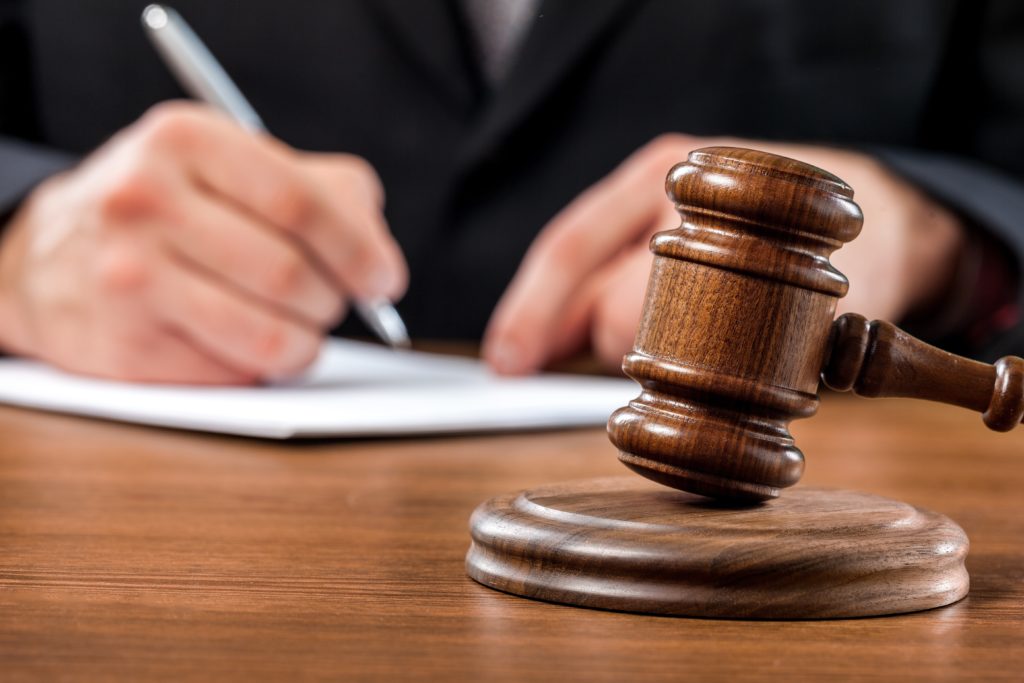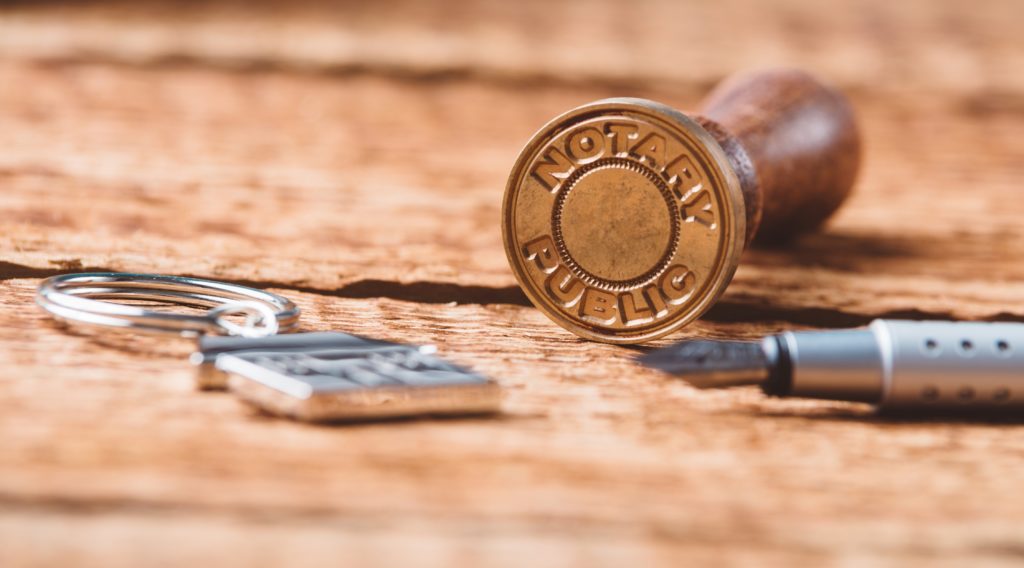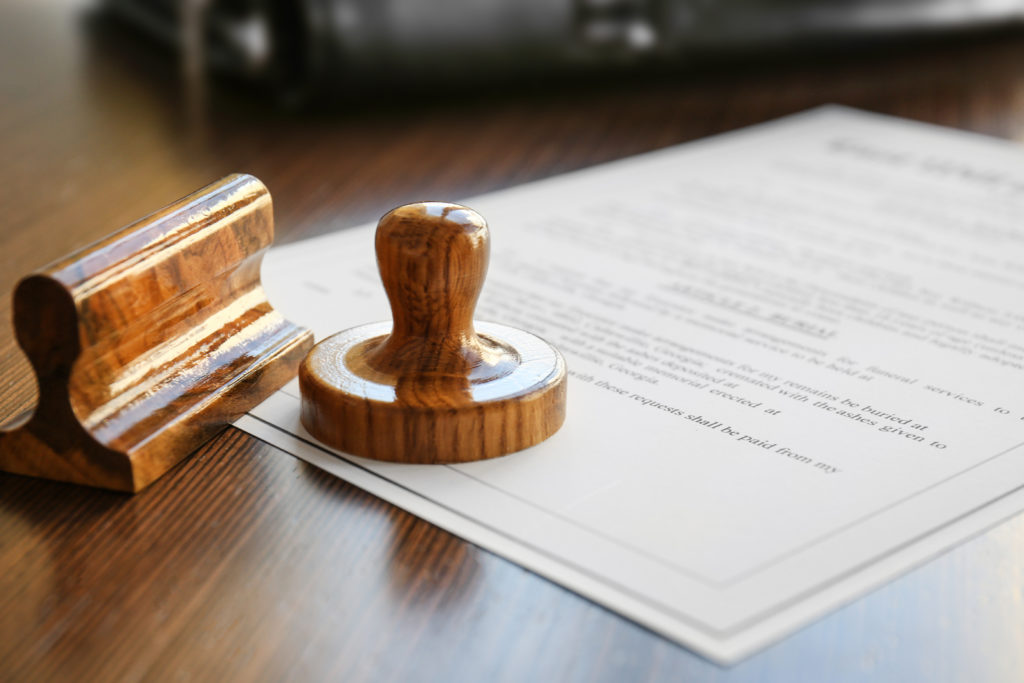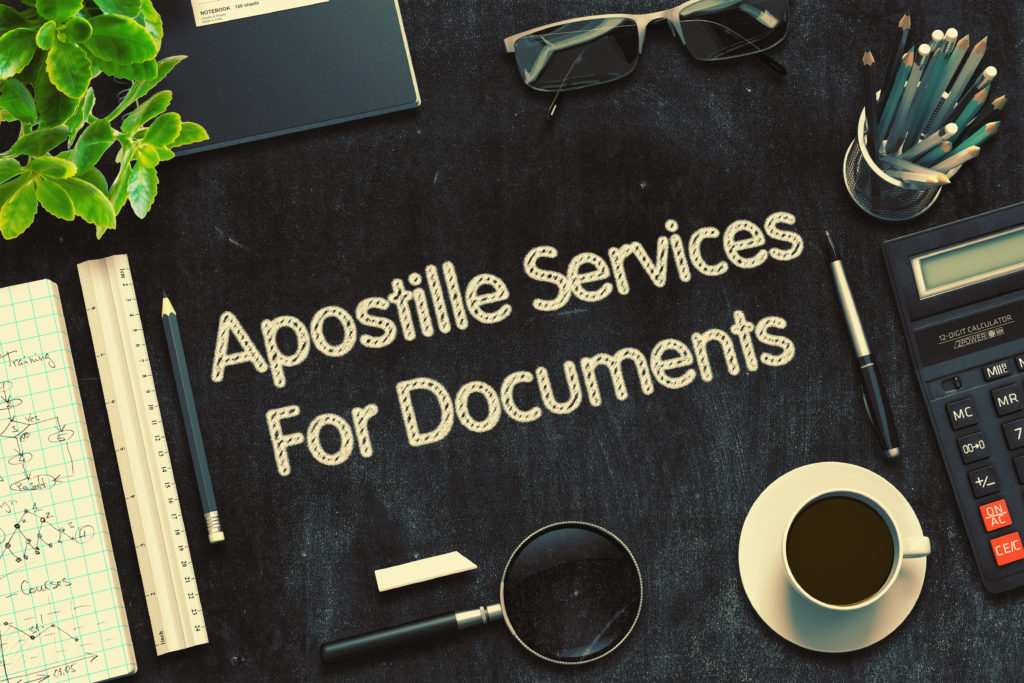More than likely, you have had to get a document notarized at one point or another in your life. A seemingly simple exchange happens where a stranger witnesses you sign some paper and suddenly it is more official. However, did you know there are different types of notarization? Your standard, run-of-the-mill notarization was likely an “acknowledgment”. On the other hand, you may encounter the need to get a “jurat” notarization. So what does that mean? In this article, we will tell you everything you need to know (and more) about the curious jurat notarization.
What is a Jurat Notarization?
The principal characteristic of a jurat notarization is the requirement for the client to verbally pronounce an oath. This oath confirms that the information in the document is truthful. The client accepts the penalty of perjury if they knowingly break the oath.
Like a standard notarization, a jurat also includes a notary witnessing the involved parties signing the document in question. However, unlike other types of notarizations, a jurat requires that the signature(s) take place physically in the presence of the notary.
What is Notarization?
Let’s take it back one step before we dive deeper into jurat notarizations. To clarify, a jurat is a specific type of notarization. A notarization is performed by a “notary public” or “notary”. This notary is a representative of the state (typically the secretary of state’s office) that acts as a witness to the signing of important documents. The notary confirms the identities of each signing party and ensures that they understand the document and are choosing willingly to sign.
A notary public is not to be confused with a “notario publico”, which is common in Hispanic cultures. The principal distinction is a notary public is not permitted to give legal advice or act as an attorney. A notario publico, on the other hand, freely acts as a lawyer for his or her clients. This is especially important to note when and if a notary public in America is working with immigrants or documents related to immigration.
When do I need a Jurat Notarization?
There are a number of documents that require notarization, but how do you know if you need a jurat specifically? It may help to understand that a jurat goes by many names. A jurat may also be called a “verification”, “affirmation”, “oath”, or more commonly an “affidavit”. Specific jargon varies based on jurisdiction.
What is an Affidavit?
As defined by the plain language legal dictionary provided by Rocket Lawyer, an affidavit is “a written statement of facts, sworn to and signed by a deponent before a notary public or some other authority having the power to witness an oath.” In other words, an affidavit is a document that requires jurat notarization, specifically. A successfully notarized affidavit will be completed with an official seal (stamp) and notary signature on a jurat notarization certificate.
Affidavits are usually tied to court cases. However, affidavits but can be essential to various other matters as well. For example, an affidavit may be as simple as documenting a change of address. On the other hand, an affidavit can also be a witnesses testimony that is crucial to a big criminal court case.
Elements of an Affidavit
Essential components of an officially notarized affidavit are as follows:
- Venue
- Preamble (typically includes the names of the signees and other information)
- Date of statement
- The statement itself
- Signature(s) of all involved parties
- Jurat Notary Certification (can be short or long form, includes the date of notarization)
- Signature of the notary presiding
- Notary seal (which includes your notary’s name, state of certification, and their commission expiration date)
How to Get a Jurat Notarization
Once you know you need to get a jurat notarization, there are a few simple steps to complete with your notary.
- Find a reputable notary in your area (more on that later)
- Physically sign the document in front of the notary (resist the urge to sign before you get there!)
- Present a proper form of identification
- The notary will administer an oath (sometimes called an affirmation), and the signer must verbally accept it aloud. Silent gestures of acknowledgment (such as a nod) are not accepted officially.
What is the Jurat Oath?
From the Oath of Office sworn by the President of the United States to the Hippocratic oath sworn by physicians, swearing an oath is clearly not to be taken lightly. Lying under oath is considered perjury and is punishable by law. Before you swear the jurat oath, you likely want to know what it is that you are swearing.
Oath and Affirmation Definitions
There are several renditions of text commonly used by notaries for oaths. The official wording varies mostly based on whether or not you choose an oath or an affirmation. Both are to be taken very seriously and encourage the signer to tell the truth. The difference is who the pledge is being sworn to. An oath is sworn to God. On the other hand, an affirmation is sworn to the client’s own honor without referring to a higher power. In any case, the choice is left up to the person accepting the oath.
Oath and Affirmation Wording
Like most details regarding notarizations, the specific wording of the actual oath or affirmation varies from state to state. However, the general sentiment of the statement is the same. According to the nationalnotary.org’s guide to notary oaths and affirmations, you can expect to hear something like this:
- Oath: “Do you solemnly state that the evidence you shall give in this issue (or matter) shall be the truth, the whole truth, and nothing but the truth, so help you God?”
- Affirmation: “Do you solemnly state, under penalty of perjury, that the evidence that you shall give in this issue (or matter) shall be the truth, the whole truth, and nothing but the truth?”
The person taking the oath will then have to verbally respond with “Yes” or “I do”.
Jurat Oath or Affirmation Best Practices
More than likely, you have seen someone accept an oath in a movie or courtroom tv show. They place their left hand on the bible and raise their right hand, followed by verbal acceptance of the oath. In the case of jurat notarizations, neither the bible or the hand raise is required by law. However, some seasoned notaries encourage the signer to raise their right hand. This simple act is a physical recognition of the seriousness of the oath itself.
Additionally, oaths are non-transferable. That is to say, whoever is signing the document must be the one to accept the oath. If more than one person’s signature is required, each individual person must accept the oath.
Jurat Certificate
Any document needing notarization of any kind requires a notary certificate. Naturally, these documents vary depending on the type of notarization performed. It should come as no surprise that a jurat notarization requires a jurat certificate. This document will confirm that the actions specific to a jurat notarization took place. The words “subscribed and sworn before me” will appear on the jurat certificate. This is a very tactful choice of words. “Sworn” validates that the client took the jurat oath. “Before me” is essential as well, because clients must sign documents physically in front of the notary to be valid.
Often times, these certificates are included in the document, simply awaiting a signature and a stamp. However, a skilled notary should have necessary certificates on hand if need be.
What is a Notary Acknowledgement?
Now that we have fully fleshed out the details of a jurat notarization, let’s discuss notary acknowledgments.
Acknowledgment Definition
A notary acknowledgment is the most common type of notarization performed. An acknowledgment is when a notary confirms the identity of the signer and bears witness to their signature on the document. Moreover, the notary will ensure that the client fully comprehends and is choosing to sign at their own will and not by force. Unlike a jurat, an acknowledgment does not require the client to take an oath. However, a jurat notarization includes all the steps required during an acknowledgment.
Types of Documents Needing Notarization
Now that we know all about different types of notarizations, in what instance would you even need to acquire one? Any document can get notarized if you want. There are literally hundreds of examples. However, there are a few that are among the more commonly notarized documents. Such as:
- Power of attorney forms
- Bills of sale
- Last will and testament
- Various contracts (often detailing financial deals)
- Prenuptial agreements
- Separation and divorce papers
- Affidavits
- Various permits
- …and so many more
Bottom line – when in doubt, notarize it! You are more likely to kick yourself for not notarizing something. Especially in the case of business and financial deals!
Where to Find a Notary
So you have a document that needs to be notarized, what now? Where can you find these magical people that can notarize your document? Well, with over 4 million certified notaries nationwide, you shouldn’t have trouble finding someone. A few places you will likely find a notary:
- The Bank – Undoubetly, your town likely has a bank or two. If you are an account holder at that particular bank, more than likely you can get documents notarized for free, or for a small fee. Additionally, credit unions and small local banks commonly offer low-cost notarization options (whether or not you hold an account there)
- Local Government Offices – Like Town Hall, City Hall, or other various government institutions. Many of these offices have at least one notary on staff and tend to offer their services out to the public as well.
- The Library – Your local library doesn’t just offer a world of literature and a quiet place to study. In fact, many public libraries offer low cost or free notary services.
- Mail Stores – Such as UPS, tend to offer notarizations for $1 per signature
- Your Office – Depending on where you work, there is a chance your employer has a notary on staff.
- Mobile Notaries – Better yet, let the notary come to you! Especially common in bigger cities, people can now hire a notary to come straight to them. Note: This service tends to come with a higher price tag to cover travel time for the notary.
- And more! – Some AAA offices, universities, real estate offices, hotels, insurance offices, and even some car dealerships offer notarization services.
Please note that times and locations vary widely based on where you live. Be sure to call around to confirm notary availability and pricing.
What to Bring to your Notary Visit
To save yourself valuable time and money, below are some tips for how to prepare for your notarization appointment.
Photo Identification
The cornerstone of any successful notarization is proper proof of identity. Accurate identification helps prevent possible fraud of forgery attempts. Notarizations are often required on documents of great importance. Therefore, increasing the likelihood of attempted fraud.
A valid passport or driver’s license are universally the most accepted forms of photo identification. Other forms of identification may include military or state i.d.’s. Required elements included on identification include:
- A recent, recognizable photo of you
- Your signature
- Issuing authority
- A physical description (such as eye color, height, etc.)
Keep in mind that each state has different acceptable forms of identification, so be sure to check with your local notary first.
The Document(s)
You must bring the document needing notarization. One would think this goes without saying, but many people forget it. Be sure to bring the document, in full, and unsigned. While a simple acknowledgment does not require you to sign in front of the notary (like a jurat does) it is best to wait to sign until your notary is there to witness it. Resist the urge to sign prematurely! Additionally, you can streamline the appointment by filling out any required fields.
All Involved Parties
Many documents calling for notarization require the signature of more than one person. If that is the case, the ultimate way to save time and money is to have all involved parties attend the same notarization appointments. While it is legal and official to have each party sign and obtain notarization separately, it takes considerably longer to get the document properly passed around.
Notary Fee
While certain offices offer free or low-cost notarization, more than likely you will have to pay a fee for the service. Notaries are, after all, professional representatives of the state. Prices vary widely amongst notaries and locations, but it is fairly common for a notary to charge per signature.
Notary Stamp
Worry not, this one is provided by the notary! The notary stamp, or seal, is the magic piece of the puzzle that makes a notarization official. The appearance of notary seals varies widely from state to state. From the shape to the icons included, there is no one specific type of notary stamp. However, every stamp includes the same three pieces of information:
- The Notary’s Name
- The state of commission (Texas, California, etc)
- The date their commission expires (most states commission notaries for four year periods at a time. A notary cannot notarize with an expired stamp)
What happens to a notarized document once the notary’s seal expires? As it was signed prior to expiration, the document is still valid.
Notary Fraud: Beware
Notarization is designed to prevent fraud. However, sometimes a notary can accidentally (or intentionally) commit notary fraud. As previously mentioned, there are millions of certified notaries in the United States. Almost anyone can become a notary simply by passing a test and paying a small fee for a certificate. In fact, over 80% of states do not require notaries to take a training course. This leaves several notaries stamping documents willy-nilly, without truly understanding the process. Save yourself the trouble of a lawsuit and read on to find out what to avoid when looking for a notary.
Notary Red Flags
There are a number of notary “no-nos” you can look out for when searching for someone to act as your notary. A notary cannot:
- Overcharge for services rendered. Most states have a legal limit that notaries can charge per signature. Find your states maximum notary fee here.
- Notarize signatures not done in person. Some companies have tried to take the hassle out of notarization by offering notarizations online or over the phone. However, legally speaking, a notary must be physically present to make a proper identification and witness the signing.
- Give legal advice. A notary and an attorney are two very different things. A notary cannot answer legal questions. Additionally, a notary cannot give legal advice regarding any content of the document.
- Draft or amend the document. Again, notaries are not lawyers. They cannot aid in the drafting or amending of the document requiring notarization. NOTE: Lawyers can, in fact, be certified notaries. However, they cannot notarize a document they had any part of drafting.
- Notarize a document on their own behalf. A notary cannot notarize their own signature or any document in which they have a personal stake (i.e. their own parent’s last will and testament). A notary can, however, notarize documents for people they know – so long as they carry no personal stake in the matter.
To avoid these issues, be sure to seek out an experienced, highly recommended notary. If you witness any of the above fraudulent acts, be sure to report the notary in question to your local secretary of state’s office.
Notary Jurats: The Bottom Line
The notary is a position that is centuries old. Over time, it is actually one of the few things that have managed to stay the same. Notarizing a document is simple. However, it is vital to protecting everyone involved in the signing of the said document. A notary will confirm each individuals identity and wholehearted willingness to sign the document. In the case of jurat notarizations, the notary will ask the signers to swear an oath confirming that the document is complete and truthful. With millions of notaries in America, one shouldn’t be hard to find. However, be sure to do your research and make sure you are working with an experienced, professional representative of the state. Now, go forth and get those documents notarized!
Sources
https://www.notarize.com/knowledge-center/what-is-a-jurat
https://notaryclassonline.com/blog/acknowledgement-vs-jurat
https://www.nationalnotary.org/notary-bulletin/blog/2015/05/your-guide-notary-oaths-affirmations
https://www.notarypublicstamps.com/articles/understanding-affidavits/
https://www.nationalnotary.org/notary-bulletin/blog/2015/08/most-common-types-of-notarizations
https://www.rocketlawyer.com/article/affidavit-definition.rl
https://www.notarypublicstamps.com/articles/verifying-the-identity-of-the-signer/
https://www.nationalnotary.org/knowledge-center/about-notaries/stamp-seal-information
https://www.thebalanceeveryday.com/where-to-notarize-affidavit-896914
https://www.sos.state.tx.us/statdoc/edinfo.shtml#List
https://www.notarize.com/knowledge-center/commonly-notarized-documents




